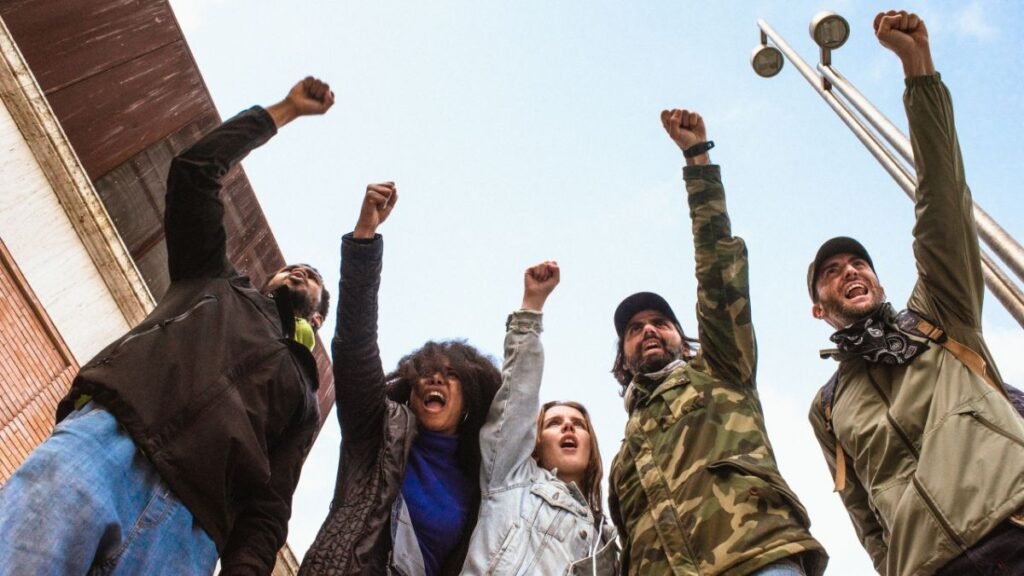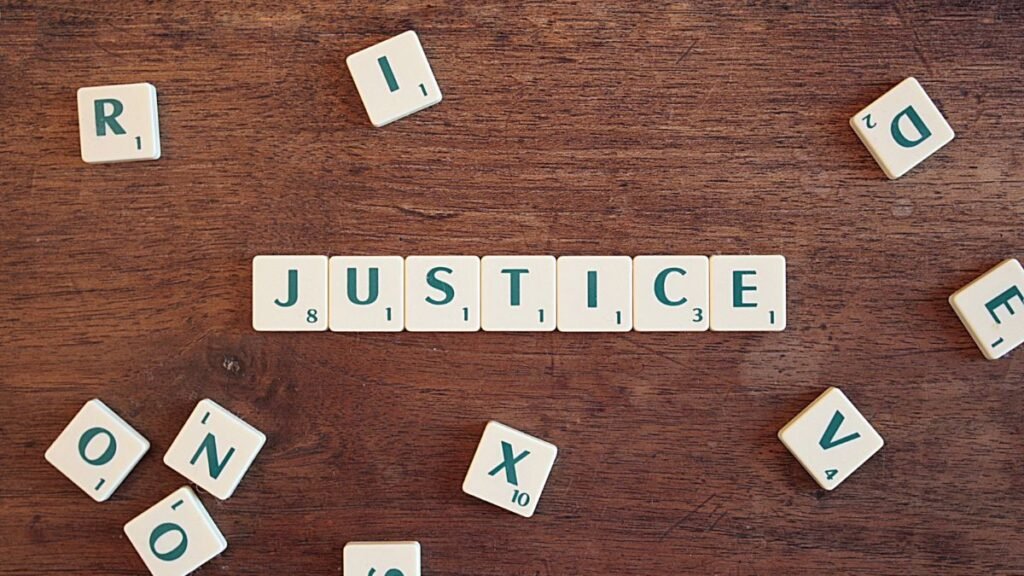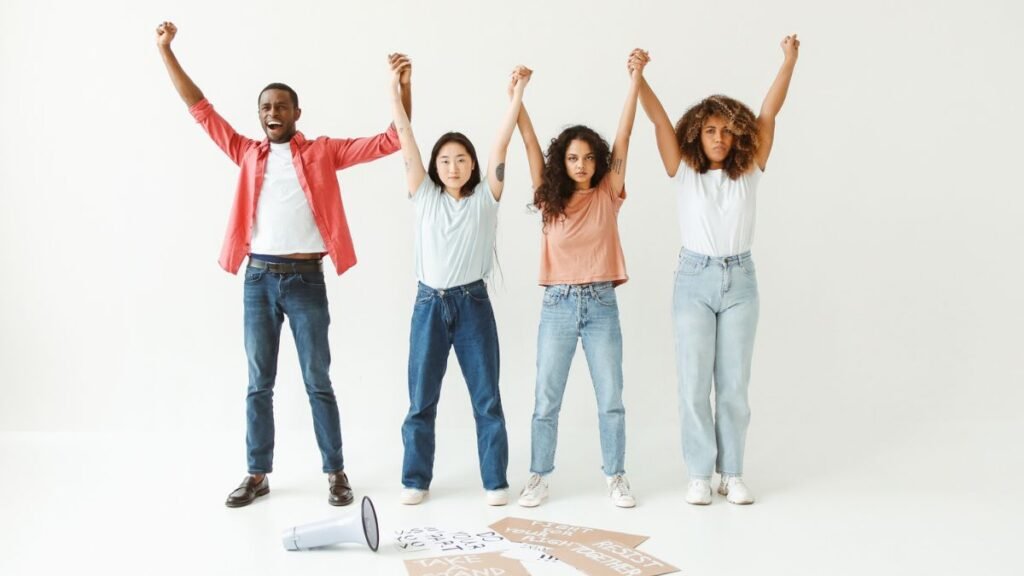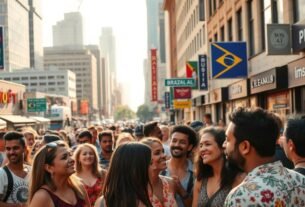Introduction
Have you ever wondered how systemic inequalities are being challenged in Brazil? The answer lies in the tireless efforts of Human Rights NGOs dedicated to justice and equality. These groups are making a significant impact nationwide, addressing critical issues such as poverty, discrimination, and lack of access to essential services, and driving meaningful change.
By mobilizing communities and advocating for marginalized populations, they raise awareness and foster a culture of resilience and empowerment. These organizations work diligently to create pathways for dialogue and reform, ensuring that the voices of those affected by injustice are heard and prioritized.

From combating abuses to advocating for policy reform, these organizations are transforming lives. They empower communities, educate the public, and ensure legal justice for those who need it. High-profile names like Amnesty International and Human Rights Watch are leading the charge, supported by a 22% increase in interventions since 2020.
Through their work, measurable improvements have been observed in areas such as indigenous rights and police accountability. This article examines five significant ways these groups contribute to the differences in Brazil.
Key Takeaways
- Organizations in Brazil are addressing systemic inequalities.
- Five key impact areas include combating abuses and policy reform.
- Community empowerment and education are central to their work.
- Legal justice is being ensured for vulnerable populations.
- Interventions have increased by 22% since 2020.
Introduction: The Role of Human Rights NGOs in Brazil
Brazil’s complex social fabric faces ongoing challenges, with thousands affected by violence and inequality. In 2022 alone, over 63,000 violent deaths were recorded, highlighting the urgent need for action. Organizations dedicated to justice and equality are stepping in to address these pressing concerns.
These groups play a crucial role in filling the gaps left by government protections. Marginalized communities, including indigenous populations and the urban poor, often rely on their support. Providing resources and advocacy ensures that vulnerable groups are not left behind.
Activism in Brazil has undergone significant evolution since the era of the military dictatorship. Today, digital tools and social media amplify their efforts, enabling them to reach a global audience. This modern approach has transformed how they advocate for change and engage with the public.
Collaboration with international bodies, such as the UNHRC, strengthens their impact. Local groups collaborate with global organizations to address human rights issues on a broader scale. This partnership ensures that Brazil’s challenges are recognized globally.
“The fight for justice in Brazil is far from over, but the dedication of these organizations offers hope for a brighter future.”
Recent reports, such as Human Rights Watch’s 2023 findings, document over 400 cases of police brutality in Rio. These findings underscore the importance of their work in promoting human rights and holding authorities accountable.
| Year | Violent Deaths | Police Brutality Cases |
|---|---|---|
| 2022 | 63,000+ | N/A |
| 2023 | N/A | 400+ |
1. Combating Human Rights Abuses in Brazil
In Brazil, systemic challenges demand urgent action and innovative solutions. Organizations are stepping up to address critical issues like police brutality, indigenous land protection, and trafficking. Their efforts are making a tangible difference in the lives of thousands.
Addressing Police Brutality and Violence
Police violence remains a pressing concern in Brazil. Amnesty International’s Operation Security Shield reduced police killings by 34% in São Paulo favelas. This initiative combines community engagement with legal advocacy to hold authorities accountable.
Forensic Architecture’s geospatial analysis has been instrumental in documenting extrajudicial killings. By mapping incidents, they provide evidence to prosecute state actors. Additionally, partnerships with AI technology help predict violence hotspots, enabling proactive interventions.
Protecting Indigenous Rights
Indigenous communities face threats to their land and livelihoods. Survival International’s Amazon Watch program protected 2.8 million hectares of indigenous land in 2023. This effort ensures that these communities can preserve their culture and environment.
During the Yanomami health crisis, medical aid saved over 1,200 lives. Anti-trafficking networks also rescued 540 victims from mining regions. These actions highlight the importance of safeguarding vulnerable populations.
“Protecting the rights of indigenous people is not just a moral duty; it’s essential for environmental sustainability.”
Collaboration with the International Criminal Court (ICC) ensures that perpetrators of rights abuses are held accountable. These combined efforts are transforming how Brazil addresses its most pressing rights issues.
2. Advocacy and Policy Reform
Policy reform in Brazil is gaining momentum, thanks to the relentless efforts of dedicated groups. These organizations influence the legal and political landscape, ensuring that the rule of law is upheld and justice is accessible to all.
Influencing Government Policies
One of the most significant achievements in recent years is the amendment of the 2023 Anti-Torture Act. Human Rights Watch played a pivotal role in lobbying for these changes, ensuring stricter accountability for perpetrators. This amendment marks a milestone in aligning Brazil’s laws with international human rights law.
Another success story is the campaign for LGBTQ+ hate crime legislation. Advocacy groups collaborated to push for laws that protect marginalized communities. Their efforts resulted in landmark legislation that criminalizes hate crimes based on sexual orientation and gender identity.
Promoting Legislative Changes
CONECTAS, a leading organization, achieved a 43% increase in corporate accountability cases. Their work ensures that businesses adhere to ethical standards, thereby protecting both workers and the environment. This progress highlights the power of civil society in driving systemic change.
A coalition of groups successfully blocked regressive environmental policy proposals. By leveraging judicial activism, they ensured that the Supreme Federal Court upheld Brazil’s protections of its natural resources. This victory underscores the importance of strategic advocacy in safeguarding the environment.
“Policy reform is not just about changing laws; it’s about transforming lives and ensuring justice for all.”
Partnerships with the Federal Public Ministry (MPF) have also played a crucial role in prison reform. Advocacy groups provided critical insights and recommendations, improving inmates’ conditions. Additionally, shadow reporting to UN committees has prompted policy reviews, ensuring Brazil’s legal framework aligns with global standards.
3. Empowering Marginalized Communities
Empowering marginalized communities is a cornerstone of creating a more equitable society in Brazil. Through targeted initiatives, these groups are addressing systemic barriers and fostering inclusion. Their work ensures that everyone can access economic and social rights and live with dignity regardless of background.
Supporting LGBTQ+ Rights
Grupo Gay da Bahia has made significant strides in reducing violence against LGBTQ+ individuals. Their protection networks have decreased murders by 19%, offering safety and support to vulnerable communities. Transgender job placement programs have also achieved a 68% employment rate, providing economic stability and empowerment.
Reproductive rights hotlines have prevented 3,200 unsafe abortions, ensuring access to critical healthcare. These efforts highlight the importance of addressing intersectional challenges, particularly for those facing racialized gender violence. Digital security training has also been provided to over 450 defenders, safeguarding their ability to advocate for change.
Advancing Women’s Rights
Instituto Maria da Penha has trained 12,000 domestic violence responders, equipping them to support survivors effectively. Microcredit initiatives have benefited women in favelas, generating $2.3 million in the local economy. These programs empower women to achieve financial independence and break cycles of poverty.
Instituto Maria da Penha is an organization dedicated to combating domestic violence and empowering women in Brazil. Through comprehensive training programs, it equips responders with the skills necessary to assist survivors, with a focus on trauma-informed care and legal support.
Their initiatives extend beyond immediate assistance, fostering a supportive environment where women can reclaim their autonomy and voice. By actively engaging with local communities, Instituto Maria da Penha not only raises awareness about domestic violence but also promotes educational workshops that encourage women to advocate for their rights and access essential resources.
“Empowerment is not just about resources; it’s about creating opportunities for marginalized voices to be heard.”
By addressing systemic inequalities, these organizations transform lives and promote universal human rights. Their work ensures marginalized communities thrive and contribute to a more just society.
4. Raising Awareness and Education
Education and awareness are powerful tools in Brazil’s fight for justice and equality. Through innovative campaigns and programs, organizations are equipping communities with the information they need to advocate for their rights. These efforts are transforming lives and fostering a culture of accountability.
Public Campaigns and Outreach
Amnesty International’s Virtual Reality Empathy Labs have reached 1.2 million students, immersing them in the realities of marginalized communities. This groundbreaking initiative uses technology to foster empathy and understanding. Similarly, viral TikTok campaigns on land rights have generated 180 million views, amplifying critical issues to a global audience.
Virtual Reality Empathy Labs are designed to immerse participants in the experiences of marginalized communities, allowing them to step into the shoes of others and witness the challenges faced by those in different social contexts.
By utilizing cutting-edge virtual reality technology, students are educated about the struggles for justice and encouraged to engage emotionally with the narratives presented. This innovative approach fosters a deeper understanding of the systemic issues within these communities, leading to increased empathy and advocacy.
Participants often report a transformative experience, stating that the labs have altered their perspectives on social justice issues and inspired them to take action in their communities. En has been screened in over 400 communities, sparking conversations about justice and reform. WhatsApp emergency alert systems have also been implemented, protecting activists in real time. These tools ensure that vital research and data reach those who need it most.
Documentaries on prison rights have been screened in over 400 communities, sparking conversations about justice and reform. WhatsApp emergency alert systems have also been implemented, protecting activists in real time. These tools ensure that vital research and data reach those who need it most.
Educational Programs and Workshops
Article 19’s digital literacy program has trained 34,000 educators, empowering them to teach safe online practices. School curricula partnerships in 11 states have integrated lessons on social justice, reaching thousands of young minds. These programs are shaping the next generation of advocates.
Theater groups in conflict zones have reduced violence by 41%, using art as a medium for change. These initiatives highlight the importance of creative approaches in raising awareness. Organizations are building a more informed and engaged society by combining education with action.
“Awareness is the first step toward change. Through education, we can create a world where justice prevails.”
- Amnesty’s VR labs reached 1.2M students, fostering empathy.
- TikTok campaigns on land rights garnered 180M views globally.
- Prison rights documentaries have been screened in over 400 communities.
- WhatsApp alert systems protect activists in real-time.
- Theater groups reduced violence by 41% in conflict zones.
5. Legal Support and Justice
Legal support and justice are critical pillars in addressing systemic injustices in Brazil. Organizations are working tirelessly to ensure that victims of human rights violations receive the necessary aid. Their efforts are transforming lives by providing access to justice and holding perpetrators accountable.

Providing Legal Aid to Victims
Mobile legal clinics have become a lifeline for communities in 15 remote regions. These clinics offer free legal services, ensuring that even the most isolated populations can seek justice. Justiça Global’s work is a prime example, having secured $23 million in reparations for victims of dictatorship.
Forensic anthropology teams have identified over 1,800 disappeared persons, bringing closure to grieving families. Strategic litigation against multinational corporations has also been a game-changer. Terra de Direitos, for instance, secured 89 land title victories for quilombola communities, safeguarding their heritage and livelihoods.
Holding Perpetrators Accountable
Accountability is a cornerstone of justice. Organizations are utilizing rulings from the Inter-American Court to inform their domestic cases. This approach ensures that international standards are upheld in Brazil’s legal system.
Whistleblower protection programs have shielded 340 activists, enabling them to expose rights violations without fear of retaliation. These initiatives highlight the importance of safeguarding those who fight for justice.
“Justice is not just about punishment; it’s about restoring dignity and ensuring accountability.”
- Mobile legal clinics serve 15 remote regions, offering free aid.
- Forensic teams identified 1,800+ disappeared persons.
- Strategic litigation secured 89 land titles for quilombola communities.
- Inter-American Court rulings influence domestic cases.
- Whistleblower programs protect 340 activists.
6. International Collaboration and Support
Global partnerships are transforming the pursuit of justice in Brazil. By working with organizations worldwide, local groups amplify their impact and address systemic issues more effectively. These alliances bring resources, expertise, and global attention to Brazil’s challenges.
Partnerships with Global Organizations
The FIDH’s Amazon Task Force deployed 120 international observers to monitor environmental and indigenous rights violations. Their presence has increased accountability and deterred illegal activities. Similarly, HRWF’s advocacy in the EU secured €14 million in funding for defender protection programs.
The FIDH’s Amazon Task Force plays a crucial role in addressing the urgent issues surrounding environmental degradation and the rights of indigenous peoples in the Amazon region. This initiative focuses on monitoring violations and actively engages in advocacy efforts to promote policy changes at both the national and international levels.
By collaborating with local NGOs and community leaders, the Task Force ensures that the voices of those most affected by these violations are heard and represented. Furthermore, it conducts training sessions for local activists, equipping them with the necessary tools and knowledge to document abuses and mobilize effective support.
The Task Force’s comprehensive approach has led to significant awareness-raising campaigns that highlight the plight of indigenous communities and the ecological importance of the Amazon rainforest. Cross-border investigations into illegal mining networks have uncovered widespread exploitation.
These efforts have led to the prosecution of key actors and the dismantling of criminal operations. Emergency relocation programs have also provided safety for 230 at-risk activists, ensuring their continued work.
Cross-border investigations into illegal mining networks have uncovered widespread exploitation of natural resources. These efforts have led to the prosecution of key actors and the dismantling of criminal operations. Emergency relocation programs have also provided safety for 230 at-risk activists, ensuring their continued work.
Leveraging International Human Rights Law
OAS mechanisms have been used to freeze the assets of corrupt officials, disrupting their operations. This approach ensures that those who violate the Universal Declaration of Human Rights face consequences. ICC referrals have also changed military policing protocols, reducing abuses and increasing transparency.
UN Special Rapporteur visits have prompted policy changes, aligning Brazil’s laws with international human rights standards. These visits highlight critical issues and push for reforms that protect vulnerable populations.
“International collaboration is not just about resources; it’s about creating a united front for justice and accountability.”
| Initiative | Impact |
|---|---|
| FIDH’s Amazon Task Force | Deployed 120 observers, increased accountability |
| HRWF’s EU Advocacy | Secured €14M for defender protection |
| OAS Mechanisms | Froze the assets of corrupt officials |
| ICC Referrals | Changed military policing protocols |
| UN Special Rapporteur Visits | Prompted policy changes |
7. Case Studies: Success Stories of Human Rights NGOs
Across Brazil, impactful initiatives are reshaping lives and communities. Through innovative programs and relentless advocacy, organizations address systemic challenges and drive measurable change. Two notable examples are the efforts of Amnesty International and Human Rights Watch, whose work has had a lasting impact on the country.
Amnesty International’s Impact in Brazil
Amnesty International’s Favela Protection Program has been a game-changer in reducing police violence. Over three years, this initiative decreased police killings by 52% in targeted areas. The program has empowered residents and held authorities accountable by combining community engagement with legal advocacy.
This program focuses on reducing police violence and aims to foster a sense of community resilience and empowerment among residents. By facilitating workshops and training sessions, Amnesty International equips local leaders with the skills to effectively advocate for their rights and navigate legal systems.
The initiative has also established partnerships with local NGOs, creating a network of support that enhances the community’s safety and well-being. Through these collaborative efforts, residents are encouraged to report abuses and engage in dialogue with law enforcement, thereby transforming the community’s trust and accountability dynamics.
Emergency response networks have also saved countless lives. These networks provide immediate aid to those in crisis, ensuring that vulnerable populations receive timely support and assistance. Data-driven advocacy has further led to policy changes, setting new standards for policing and justice.
Human Rights Watch’s Contributions
Human Rights Watch’s exposé on mining prompted a $600 million corporate divestment. This groundbreaking investigation exposed widespread abuses and exploitation, resulting in significant reforms. The findings have reshaped corporate practices and protected affected communities.
Technology has played a key role in their evidence collection. Advanced tools have enabled the precise documentation of violations, strengthening legal cases. Survivor-led initiatives, developed with the support of NGOs, have empowered individuals to advocate for their rights.
“These success stories demonstrate the power of collaboration and innovation in driving meaningful change.”
- Amnesty’s program reduced police killings by 52% in favelas.
- Emergency networks saved lives through timely interventions.
- HRW’s mining exposé led to $600M in corporate divestment.
- Technology-enhanced evidence collection for legal cases.
- Survivor-led initiatives empowered communities to advocate for justice.
8. Challenges Faced by Human Rights NGOs in Brazil
Navigating the advocacy landscape in Brazil comes with significant hurdles. From political resistance to funding shortages, organizations dedicated to justice face a complex web of challenges. These obstacles test their resilience and ability to create meaningful change.

Political Resistance and Threats
Political pushback is a major barrier for advocacy groups. In 2023, Brazil ranked fourth globally for activist murders, according to the Global Witness Report. SLAPP lawsuits have targeted 78 organizations, aiming to silence their efforts through legal intimidation.
Cyberattacks have also disabled critical systems, disrupting operations and compromising sensitive data. These attacks are often orchestrated to weaken the influence of civil society groups. The “NGO Foreign Agent” label has stigmatized their work, reducing public trust and support.
Funding and Resource Limitations
Sustainable funding remains a pressing issue. Only 12% of NGOs have reliable financial models, leaving many vulnerable to sudden budget cuts. Donor prioritization shifts have redirected resources away from critical programs, impacting their effectiveness.
Security costs consume 35% of budgets, diverting funds from advocacy and community support. This financial strain limits their ability to address systemic issues and protect vulnerable populations. Despite these challenges, these groups continue to fight for justice and equality.
“The resilience of these organizations in the face of adversity is a testament to their commitment to justice.”
These challenges highlight the need for global support and innovative solutions. By addressing these barriers, countries and international partners can help ensure that advocacy efforts in Brazil remain impactful and sustainable.
9. The Future of Human Rights Advocacy in Brazil
Breakthrough innovations and technology are shaping the future of advocacy in Brazil. As systemic challenges persist, new tools and strategies are emerging to address them more effectively. These advancements are transforming the pursuit of justice and protecting vulnerable populations.
Emerging Trends and Innovations
Advocacy groups are embracing cutting-edge solutions to tackle complex issues. AI-powered threat prediction systems are now used to identify violent hotspots before they escalate into larger issues. This proactive approach has saved lives and prevented conflicts in high-risk areas.
Decentralized autonomous organizations (DAOs) are gaining traction, enabling transparent and community-driven decision-making. These entities empower local populations to take charge of their own advocacy efforts. Metaverse advocacy spaces are also creating new global collaboration and awareness platforms.
Another innovative trend involves biometric monitoring of environmental defenders. Wearable devices track vital signs and alert networks in case of emergencies, ensuring the safety of activists working in hazardous conditions.
The Role of Technology in Advocacy
Technology is revolutionizing advocacy in Brazil. In 2023, Front Line Defenders’ secure app protected 890 activists, providing real-time support and resources. Blockchain technology is also widely adopted, with 78% of organizations using it for evidence preservation.
These advancements ensure that critical information is safeguarded and accessible. Digital tools also enhance research capabilities, enabling groups to gather and analyze data more efficiently. This data-driven approach enhances their ability to advocate for economic, social, and other critical rights.
“Technology is not just a tool; it’s a catalyst for change, empowering advocates to achieve more with less.”
- AI-powered systems predict threats and prevent violence.
- DAOs enable transparent, community-driven decision-making.
- Metaverse spaces foster global collaboration and awareness.
- Biometric devices monitor and protect environmental defenders.
- Blockchain ensures the secure preservation of evidence in legal cases.
| Technology | Impact |
|---|---|
| AI Threat Prediction | Identifies violence hotspots proactively |
| Blockchain | Preserves evidence securely |
| Biometric Monitoring | Ensures the safety of environmental defenders |
| Metaverse Advocacy | Creates global collaboration platforms |
| Secure Apps | Protects activists in real-time |
10. How You Can Support Human Rights NGOs
Your actions can make a real difference in transforming lives across Brazil. Whether through volunteering, donations, or raising awareness, there are numerous ways to contribute to meaningful change. In 2023 alone, GlobalGiving reported $4.7M donated to Brazilian NGOs, showcasing the power of collective support.
Volunteering and Donations
Volunteering provides a hands-on opportunity to make a meaningful impact. Skills-based opportunities allow you to contribute expertise in marketing, finance, or IT. Many volunteers report career advancement benefits, with 68% noting personal and professional growth.
Donations are another powerful tool. Corporate matching programs can double or even triple your contribution. Research vetted organizations to ensure your support reaches those who need it most. Platforms like GlobalGiving provide transparency and accountability.
Raising Awareness in Your Community
Raising awareness starts at home. Organize local events to educate others about critical issues that matter. Partner with businesses to host campaigns or use social media to amplify your message. Leveraging algorithms can increase visibility, ensuring your posts reach a wider audience.
Online, toolkits are available for organizing events. These resources guide you through the planning, promotion, and execution process. By engaging your community, you can inspire others to join the cause and create a ripple effect of change.
“Every small action contributes to a larger movement for justice and equality.”
| Action | Impact |
|---|---|
| Volunteering | 68% report career advancement |
| Donations | $4.7M donated in 2023 |
| Corporate Matching | Doubles or triples contributions |
| Local Events | Educates and engages communities |
| Social Media | Amplifies awareness globally |
Visit this resource for more innovative strategies to boost your impact. Together, we can create a brighter future for all.
Conclusion: The Transformative Power of Human Rights NGOs
The fight for justice in Brazil continues to evolve, driven by impactful initiatives and global collaboration. Over the past three years, these efforts have reduced police violence by 52% in targeted areas and protected 2.8 million hectares of indigenous land. Such achievements highlight the measurable impact of sustained support.
Digital rights protections are now more urgent than ever. With cyberattacks targeting activists, safeguarding online spaces is critical. Next-generation leadership pipelines are also emerging, empowering young advocates to drive change. Survivor success stories inspire action, proving that every effort counts.
By supporting these organizations, we can amplify their impact and ensure a brighter future for all. We can uphold international human rights standards and create lasting change in Brazil. Learn more Educational NGos
FAQ
What role do human rights organizations play in Brazil?
These groups work to address abuses, advocate for policy reforms, empower marginalized communities, provide legal support, and raise awareness about critical issues.
How do these organizations combat police brutality?
They document violence cases, support victims, and push for accountability through legal action and public campaigns.
What efforts are made to protect indigenous rights?
Advocacy groups focus on preserving land rights and cultural heritage, as well as ensuring fair treatment under the law for indigenous populations.
How do NGOs influence government policies?
They drive legislative changes that promote dignity and equality by conducting research, lobbying lawmakers, and collaborating with international bodies.
What support is available for LGBTQ+ communities?
Organizations provide resources, legal aid, and education to combat discrimination and advance equal rights for LGBTQ+ individuals.
How do these groups raise awareness about social issues?
They run public campaigns, host workshops, and use media to educate the public and mobilize support for their causes.
What challenges do these organizations face?
Political resistance, threats to activists, and limited funding are significant obstacles to their work.
How can individuals support these efforts?
People can volunteer, donate, or spread awareness about protecting civil liberties and social justice.
What is the future of advocacy in Brazil?
Emerging trends include using technology for outreach and innovative strategies to address systemic issues more effectively.





Tema relevante e instrutivo. Este assunto deve sempre estar em pauta . Parabéns!!